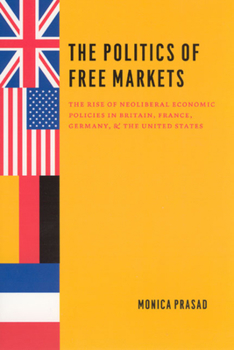The Politics of Free Markets: The Rise of Neoliberal Economic Policies in Britain, France, Germany, and the United States
The attempt to reduce the role of the state in the market through tax cuts, decreases in social spending, deregulation, and privatization-"neoliberalism"-took root in the United States under Ronald Reagan and in Britain under Margaret Thatcher. But why did neoliberal policies gain such prominence in these two countries and not in similarly industrialized Western countries such as France and Germany? In The Politics of Free Markets, a comparative-historical analysis of the development of neoliberal policies in these four countries, Monica Prasad argues that neoliberalism was made possible in the United States and Britain not because the Left in these countries was too weak, but because it was in some respects too strong. At the time of the oil crisis in the 1970s, American and British tax policies were more punitive to business and the wealthy than the tax policies of France and West Germany; American and British industrial policies were more adversarial to business in key domains; and while the British welfare state was the most redistributive of the four, the French welfare state was the least redistributive. Prasad shows that these adversarial structures in the United States and Britain created opportunities for politicians to find and mobilize dissatisfaction with the status quo, while the more progrowth policies of France and West Germany prevented politicians of the Right from anchoring neoliberalism in electoral dissatisfaction.
Format:Paperback
Language:English
ISBN:0226679020
ISBN13:9780226679020
Release Date:July 2006
Publisher:University of Chicago Press
Length:280 Pages
Weight:1.02 lbs.
Dimensions:0.7" x 6.1" x 8.9"
Customer Reviews
0 rating





